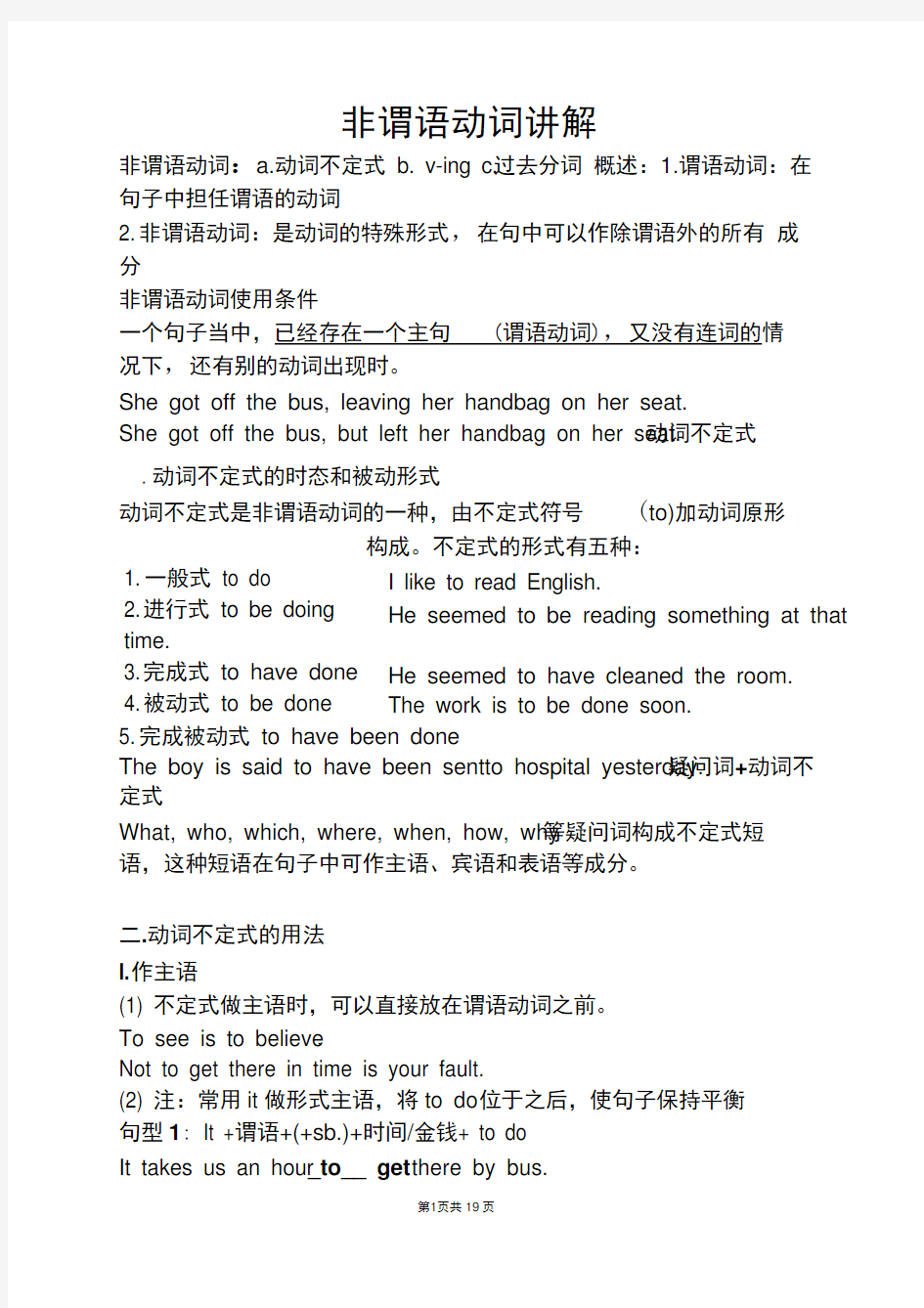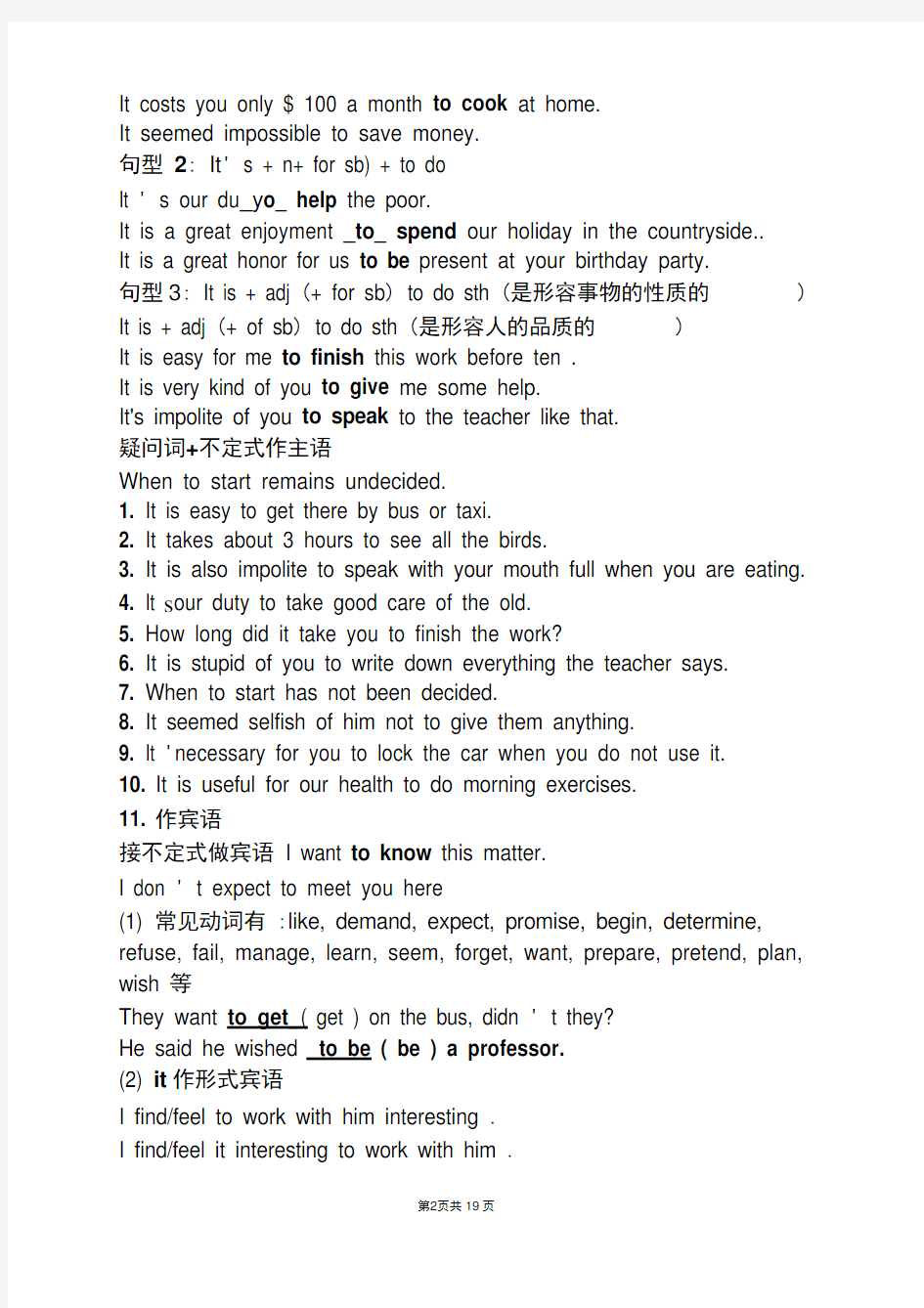非谓语动词讲解(超全超实用)


非谓语动词讲解
非谓语动词:a.动词不定式 b. v-ing c.过去分词 概述:1.谓语动词:在句子中担任谓语的动词
2. 非谓语动词:是动词的特殊形式,在句中可以作除谓语外的所有 成分
非谓语动词使用条件
一个句子当中,已经存在一个主句
(谓语动词),又没有连词的情 况下,还有别的动词出现时。
She got off the bus, leaving her handbag on her seat.
She got off the bus, but left her handbag on her seat. 动词不定式 .动词不定式的时态和被动形式
动词不定式是非谓语动词的一种,由不定式符号 (to)加动词原形
构成。不定式的形式有五种:
I like to read English.
He seemed to be reading something at that He seemed to have cleaned the room.
The work is to be done soon.
5. 完成被动式 to have been done
The boy is said to have been sentto hospital yesterday. 疑问词+动词不定式
What, who, which, where, when, how, why 等疑问词构成不定式短 语,这种短语在句子中可作主语、宾语和表语等成分。
二.动词不定式的用法
I.作主语
(1) 不定式做主语时,可以直接放在谓语动词之前。
To see is to believe .
Not to get there in time is your fault.
(2) 注:常用it 做形式主语,将to do 位于之后,使句子保持平衡 句型1: It +谓语+(+sb.)+时间/金钱+ to do
It takes us an hour _to__ get there by bus.
1. 一般式 to do
2. 进行式 to be doing time.
3. 完成式 to have done
4. 被动式 to be done
It costs you only $ 100 a month to cook at home.
It seemed impossible to save money.
句型2: It' s + n+ for sb) + to do
It ' s our du_y o_ help the poor.
It is a great enjoyment _to_ spend our holiday in the countryside..
It is a great honor for us to be present at your birthday party.
句型3: It is + adj (+ for sb) to do sth (是形容事物的性质的) It is + adj (+ of sb) to do sth (是形容人的品质的)
It is easy for me to finish this work before ten .
It is very kind of you to give me some help.
It's impolite of you to speak to the teacher like that.
疑问词+不定式作主语
When to start remains undecided.
1. It is easy to get there by bus or taxi.
2. It takes about 3 hours to see all the birds.
3. It is also impolite to speak with your mouth full when you are eating.
4. It s our duty to take good care of the old.
5. How long did it take you to finish the work?
6. It is stupid of you to write down everything the teacher says.
7. When to start has not been decided.
8. It seemed selfish of him not to give them anything.
9. It 'necessary for you to lock the car when you do not use it.
10. It is useful for our health to do morning exercises.
11. 作宾语
接不定式做宾语I want to know this matter.
I don ' t expect to meet you here
(1) 常见动词有 :like, demand, expect, promise, begin, determine, refuse, fail, manage, learn, seem, forget, want, prepare, pretend, plan, wish 等
They want to get_( get ) on the bus, didn ' t they?
He said he wished _to be ( be ) a professor.
(2) it作形式宾语
I find/feel to work with him interesting .
I find/feel it interesting to work with him .
Subject+ find/think/feel/make/ consider it+adj/n + to-do sth. 1We thought _it__ better _to_ start early.
2. D o you consider _ it__ better not _to_ go?
3.1 feel _ it_ my duty _to_ change all that.
4. W e think it __ important _ to _ obey the law.
5.1 know _ it _ impossible _ to _ finish so much homework in a day .
(3) 疑问词+不定式作宾语
常常放在这些动词的后面作宾语:
tell, advise, show, teach, find out, decide, discuss, learn, explain
He taught us how to use the tool.
No one could tell me where to get the book.
The dictionary didn 'tell the Frenchman how to pronounce the word.
(4) 作介词but, except, besides 的宾语。
Can'choose but do
Can'help but do/have no choice to do
Do nothing but do
Practice:
1. Would you like to go to Thailand? (would like to do sth.)
2. The driver failed to see the other car in time.
3. I think it our duty to obey the laws.
4. Do you know how to play football?
5. I found it difficult to see him here.
6. Here are some ideas about how to find cheap, fun things to do with your family on weekends.
7. Many people like to go to a restaurant.
8. I haven't decided whether to go or stay.
9. Everyone wants to have a happy weekend.
10. She hope I l ladvise her which to choose.
III.作宾语补足语
1.1 'et someone _o— repair the recorder for you .
2. What caused him _to change his mind?
v.+ sb.+ to do
advise, allow, ask, beg, cause, expect, encourage, force, get, hate, invite , order, wish , want, warn, remind, promise, permit, persuade, request+ sb. to do
注意:(1)在动词feel (一感),hear, listen to (二听),have, let,
make (三使),notice, see, watch, observe, look at (五看) (即:吾看三室两厅一感觉)等后面的补足语中,不定式不带to,但变为被动语态后,必须带to。
v.+ sb.+ do
Let' go to Thailand right now. ( let sb. do sth.)
They saw the boy fall off the tree . (see sb. do sth.)
The boy was seen to fall off the tree.
He is often heard to sing (sing) the song.
Though he often made his deskmate cry (cry).Today he was made to cry(cry) by his deskmate. (make sb. do sth.)
(2) help后面作宾语补足语的不定式可以带to,也可以不带to.
I often help him ( to) clean the room. [help sb. (to) do sth.]
I helped him (to) find his things .
比较:
The professor told the students how to do the experiment .
The professor told the students to do the experiment.
Practice:
1. No one lets you sit in the office.
2. I want you to know some rules.
3. I heard her sing today. She sang wonderful.
4. We watched the children play games.
5. Do you feel the house shake?
6. The boss made the workers work for 12 hours a day.
7. We were made to make ten sentences with these words.
8. I,m waiting for Tom to give the answer.
9. Would you like her sing a song for us?
10. Did anyone notice a strange man come into the bank?
IV .作定语
I have something to tell you. (不定式作定语)
1. 被修饰词是不定式的逻辑主语
She is always the last to leave the room.
We need someone to help with the work.
She is always the first to answer questions.
2. 不定式用来说明所修饰词的内容
I have no chance to go there.
He made a promise to be a good boy.
There is no need to build a dam on the small river.
3. 不定式与它所修饰的词有动宾关系
Do you have anything to wash today?
One of the most interesting places to visit in Singapore is Bird Park. 不定式为不及物动词且和所修饰的名词是动宾关系时,须加介词He bought a cup to drink water with.
I have nothing to complain about.
He is looking for a room to live in.
Practice:
1. Each member can choose a film for the evening to watch together.
2. He sat down at a table and waited for someone to take his order. 3」s this the best way to help him?
4. Please give me something to drink.
5. She has a child to take care of.
6. He is not the kind of man to do such things.
7. It is already time to begin our class.
8. Thank you for giving me the chance to make the speech.
9. She bought a bookshelf to put her books on.
10. You are the only person to be late.
V.作状语不定式作状语可以表示目的、原因、结果。
I came here to see you.(目的)
We were very excited to hear the news.(原因)
He hurried to the school to find nobody there .(结果)
(1)作目的状语表示谓语动作的目的,其逻辑主语通常是句子的
主语。强调动词不定式所表示的目的时,动词不定式可用
in order to +V.(原形)
so as to +V.(原形)
但so as to不用于句首。
The student saved much money to buy a new mobile phone .
He got up early in order to/so as to catch the first bus.
=In order to catch the first bus , he got up early.
People have learnt the importance of keeping a balanced diet _to satisfy _____ (satisfy) their nutritional needs .
(2)作结果状语
不定式作结果状语时,多表示出乎意料的结果,其逻辑主语通常
